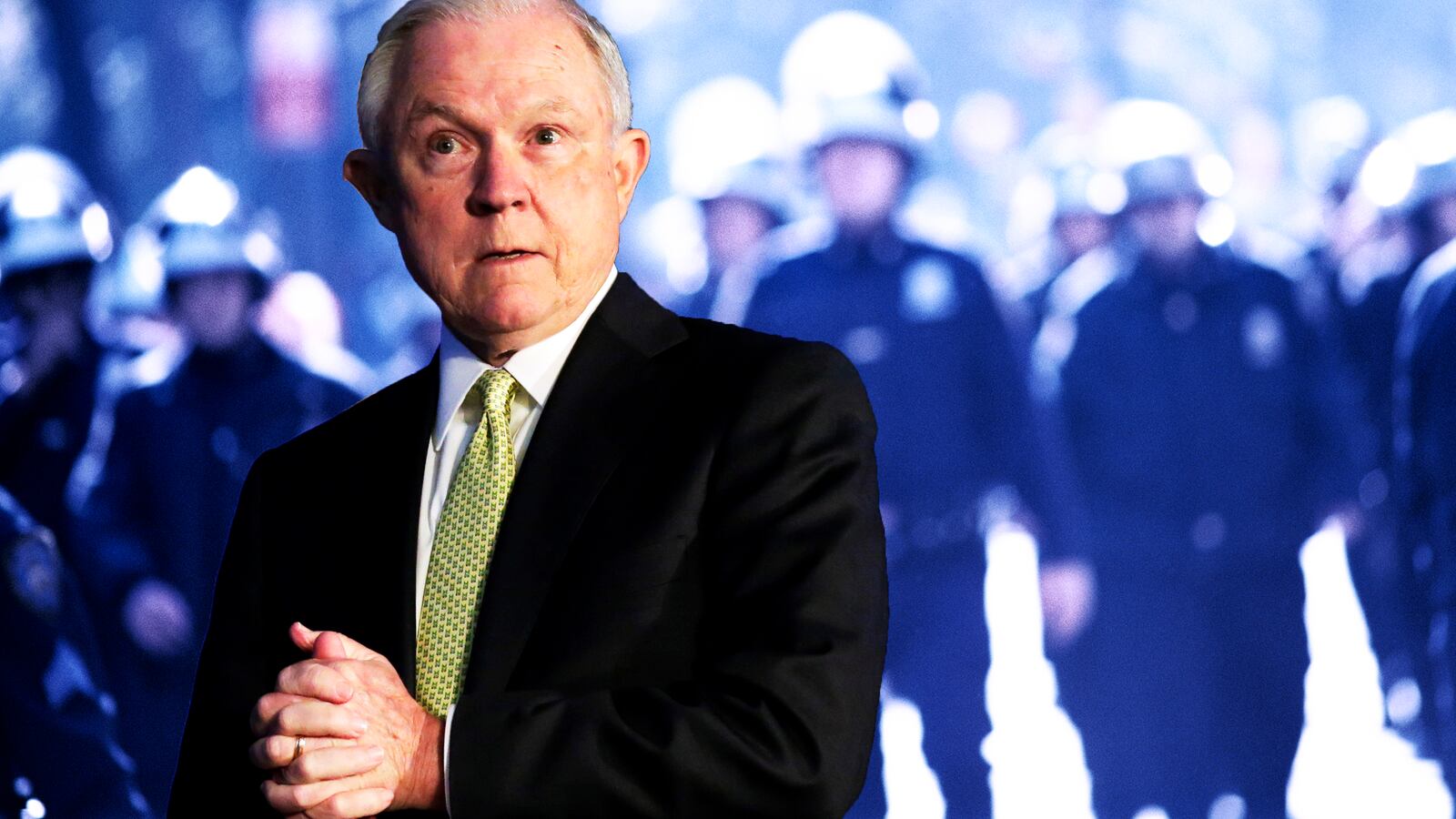In the five months since he was sworn in as Attorney General, Jeff Sessions has made crystal clear his plan to Make America Great Again. It’s a scheme that harkens back to the good ole days of punishing three-strikes laws, humiliating stop and frisk practices, and filled-to-the-brim federal prisons.
In a May memo to federal prosecutors, Sessions mandated they pursue the harshest punishments legally allowed, a sweeping reversal of Obama-era policies that gave federal lawyers more leeway to reserve such prosecutions for criminals who had committed the worst of crimes.
“It is a core principle that prosecutors should charge and pursue the most serious, readily provable offense,” said Sessions.
Sessions’ own core principles come into question, however, when the subject shifts to police reform, and the need for wholesale change inside corrupt police departments that harbor and protect rogue, abusive cops. In Chicago, three police officers have been indicted on charges of conspiracy, official misconduct and obstruction of justice for attempting to interfere with the investigation into the 2014 killing of 17-year-old LaQuan McDonald.
Police officer Jason Van Dyke, who is charged with first degree murder and multiple counts of aggravated battery, said he opened fire on McDonald after the teenager lunged at him and swung a knife “in an aggressive, exaggerated manner." Van Dyke’s story was backed up by three officers at the scene, who allegedly filed false reports in order to protect Van Dyke.
But dashcam video that was later released contradicted the officers’ accounts, and showed that McDonald was walking away from police.
In a move that stunned veteran prosecutors and even civil rights attorneys, a special prosecutor indicted Van Dyke’s partner, Thomas Gaffney, and two former white Chicago police officers--Joseph Walsh and David March—for lying and creating a false narrative to protect their fellow officer.
All three pled not guilty on Monday to covering up what happened the night that Van Dyke, a white officer, shot the African American teen 16 times. Sessions and the Department of Justice have been curiously silent about the rare indictment and the shocking allegations of police corruption of the worst kind and the proverbial “blue wall of silence” that fuels the conduct of the three indicted officers.
In fact, in a February speech to the National Association of Attorneys General, Sessions glossed over the problem entirely, saying that “law enforcement as a whole has been unfairly maligned and blamed for the unacceptable deeds of a few bad actors.” Even though the indictments had not been handed down in the Chicago shooting at the time of the speech, there had been a number of high profile cases involving white officers shooting and killing black men where there were serious questions about the veracity of their accounts and those of their fellow officers. Yet Sessions has not made rooting out rogue cops one of the pillars of his “law and order” administration even though there is clear evidence that some officers lie and cover up critical evidence to protect their peers.
A 2000 study by the National Institute of Ethics suggests that what Sessions describes as the actions of a few bad actors is in fact a festering systemic problem that’s been made all the more difficult by the infamous blue wall or police code of silence.
The study, which represents the most extensive research ever on the code of silence, surveyed 3,714 officers and academy recruits from 42 different states. The results were nothing short of jaw-dropping:
· 79% of respondents said that a law enforcement code of silence exists and is fairly common throughout the nation.
· 52% said that the fact a code of silence exists doesn’t really bother them.
· 24% said the code of silence is more justified when excessive force involves a citizen who is abusive.
In response to a question asking officers to “Please describe the first time you witnessed misconduct by another employee but took no action,” 46 percent said they had witnessed misconduct by another employee, but concealed what they knew.
Fully 177 officered said they feared being ostracized if they spoke out against an abusive officer, and 73 said they thought they’d be fired from their job. Perhaps the most astounding finding—73 percent of the individuals pressuring officers to keep quiet about the misconduct were leaders.
For the family of African American motorist Samuel Dubose, the code is more than just an abstract concept. It’s a reality that help set his killer free. In July of 2015, Dubose was unarmed when he was shot and killed by Cincinnati Police Officer Ray Tensing during a traffic stop. Tensing claimed he was forced to shoot DuBose after he attempted to drive off, and that he was being dragged because his arm was caught in the car.
Police officer Phillip Kidd, despite arriving on the scene after the shooting, is later heard on his bodycam footage supporting Tensing’s statement that he was dragged. Police officer Eric Weibel also supported Tensing’s version of events, even though he, too, was not present at the time of the shooting. In a police report, Weibel said Tensing’s uniform “looked like he had been dragged.”
But Hamilton County Prosecuting Attorney Joe Deters reached a different conclusion when he reviewed the bodycam footage. At a press conference Deters said the shooting was “asinine” and “senseless,” and that DuBose was not acting violently or aggressively. But despite the video evidence, jurors were unable to convict Tensing of murder or manslaughter.
Tensing is hardly alone when it comes to trigger-happy policemen who are protected by their colleagues.
In South Carolina, a black officer aided and abetted moving evidence in the killing of Walter Scott, a 50-year-old forklift operator who was unarmed at the time of the shooting.
Civil Rights activists hope the indictments in the McDonald case send a strong signal to police that in an age where cellphone cameras and dashcams are everywhere, following the code of silence will land you in jail.
In one of its last acts, the Obama Justice Department released a searing report that found that Chicago police had for years used excessive force, violated people’s constitutional rights and operated in an environment where there was little chance they would be disciplined for lying.
As Attorney General, Jeff Sessions has an opportunity to follow up on that work, and not act as a fanboy to police. If justice is truly blind, then Sessions’ vow to crackdown on crime must include all violent thugs, including the ones who wear badges. Anything else is, i as his boss would say, sad.





